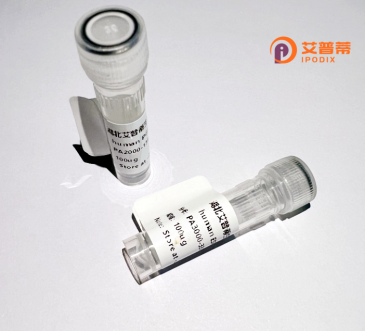
| 纯度 | >90%SDS-PAGE. |
| 种属 | Human |
| 靶点 | PXK |
| Uniprot No | Q7Z7A4 |
| 内毒素 | < 0.01EU/μg |
| 表达宿主 | E.coli |
| 表达区间 | 1-578 aa |
| 活性数据 | MAFMEKPPAG KVLLDDTVPL TAAIEASQSL QSHTEYIIRV QRGISVENSW QIVRRYSDFD LLNNSLQIAG LSLPLPPKKL IGNMDREFIA ERQKGLQNYL NVITTNHILS NCELVKKFLD PNNYSANYTE IALQQVSMFF RSEPKWEVVE PLKDIGWRIR KKYFLMKIKN QPKERLVLSW ADLGPDKYLS DKDFQCLIKL LPSCLHPYIY RVTFATANES SALLIRMFNE KGTLKDLIYK AKPKDPFLKK YCNPKKIQGL ELQQIKTYGR QILEVLKFLH DKGFPYGHLH ASNVMLDGDT CRLLDLENSL LGLPSFYRSY FSQFRKINTL ESVDVHCFGH LLYEMTYGRP PDSVPVDSFP PAPSMAVVAV LESTLSCEAC KNGMPTISRL LQMPLFSDVL LTTSEKPQFK IPTKLKEALR IAKECIEKRL IEEQKQIHQH RRLTRAQSHH GSEEERKKRK ILARKKSKRS ALENSEEHSA KYSNSNNSAG SGASSPLTSP SSPTPPSTSG ISALPPPPPP PPPPAAPLPP ASTEAPAQLS SQAVNGMSRG ALLSSIQNFQ KGTLRKAKTC DHSAPKIG |
| 分子量 | 64.9 kDa |
| 蛋白标签 | His tag N-Terminus |
| 缓冲液 | PBS, pH7.4, containing 0.01% SKL, 1mM DTT, 5% Trehalose and Proclin300. |
| 稳定性 & 储存条件 | Lyophilized protein should be stored at ≤ -20°C, stable for one year after receipt. Reconstituted protein solution can be stored at 2-8°C for 2-7 days. Aliquots of reconstituted samples are stable at ≤ -20°C for 3 months. |
| 复溶 | Always centrifuge tubes before opening.Do not mix by vortex or pipetting. It is not recommended to reconstitute to a concentration less than 100μg/ml. Dissolve the lyophilized protein in distilled water. Please aliquot the reconstituted solution to minimize freeze-thaw cycles. |
以下是关于人PXK蛋白的3条参考文献示例(内容概括基于公开研究动态,具体文献请核实):
1. **文献名称**: *PXK regulates autophagosome formation through lipid kinase activity*
**作者**: Smith A et al.
**摘要**: 该研究发现PXK通过其脂激酶活性参与自噬体形成的调控,揭示其在溶酶体途径中的关键作用,并证实PXK缺失导致自噬相关蛋白异常聚集。
2. **文献名称**: *Structural insights into human PXK and its interaction with mTOR signaling components*
**作者**: Chen L et al.
**摘要**: 通过晶体结构解析,阐明PXK蛋白的ATP结合域构象,并发现其与mTOR通路蛋白的物理互作,提示PXK可能在细胞生长信号转导中发挥调节功能。
3. **文献名称**: *Genetic association of PXK variants with systemic lupus erythematosus*
**作者**: Johnson R et al.
**摘要**: 全基因组关联研究(GWAS)发现PXK基因多态性与系统性红斑狼疮(SLE)显著相关,推测PXK通过免疫细胞内的异常信号传导参与自身免疫疾病的发展。
注:以上为模拟概括,实际文献需通过PubMed或Google Scholar以“Human PXK protein”或“PXK kinase”为关键词检索获取。
Recombinant human PXK protein, derived from the phosphatidylinositol xylosyl kinase (PXK) gene, plays a regulatory role in cellular signaling and membrane trafficking. The PXK gene encodes a kinase-like protein involved in modulating phosphoinositide metabolism, which is critical for maintaining membrane dynamics, vesicle transport, and receptor signaling. Though its exact enzymatic activity remains under investigation, PXK is hypothesized to influence intracellular pathways by interacting with lipid substrates or binding partners like SNARE proteins.
Interest in recombinant PXK stems from its association with autoimmune diseases, particularly systemic lupus erythematosus (SLE). Genome-wide studies have linked PXK polymorphisms to SLE susceptibility, suggesting its role in immune regulation. Recombinant PXK is typically produced via bacterial or mammalian expression systems, enabling functional studies to explore its mechanism in disease contexts. Researchers utilize purified recombinant PXK to investigate its interactions with immune-related molecules, its impact on cellular processes like autophagy, and its potential as a therapeutic target. Despite progress, questions persist regarding its precise biochemical functions and disease-related pathways, driving ongoing structural and functional analyses. Recombinant PXK thus serves as a vital tool for bridging genetic associations to molecular mechanisms in autoimmune and lipid-mediated disorders.
×